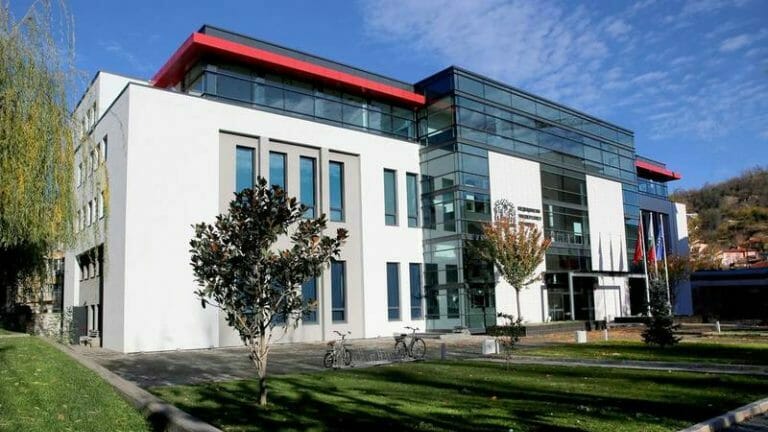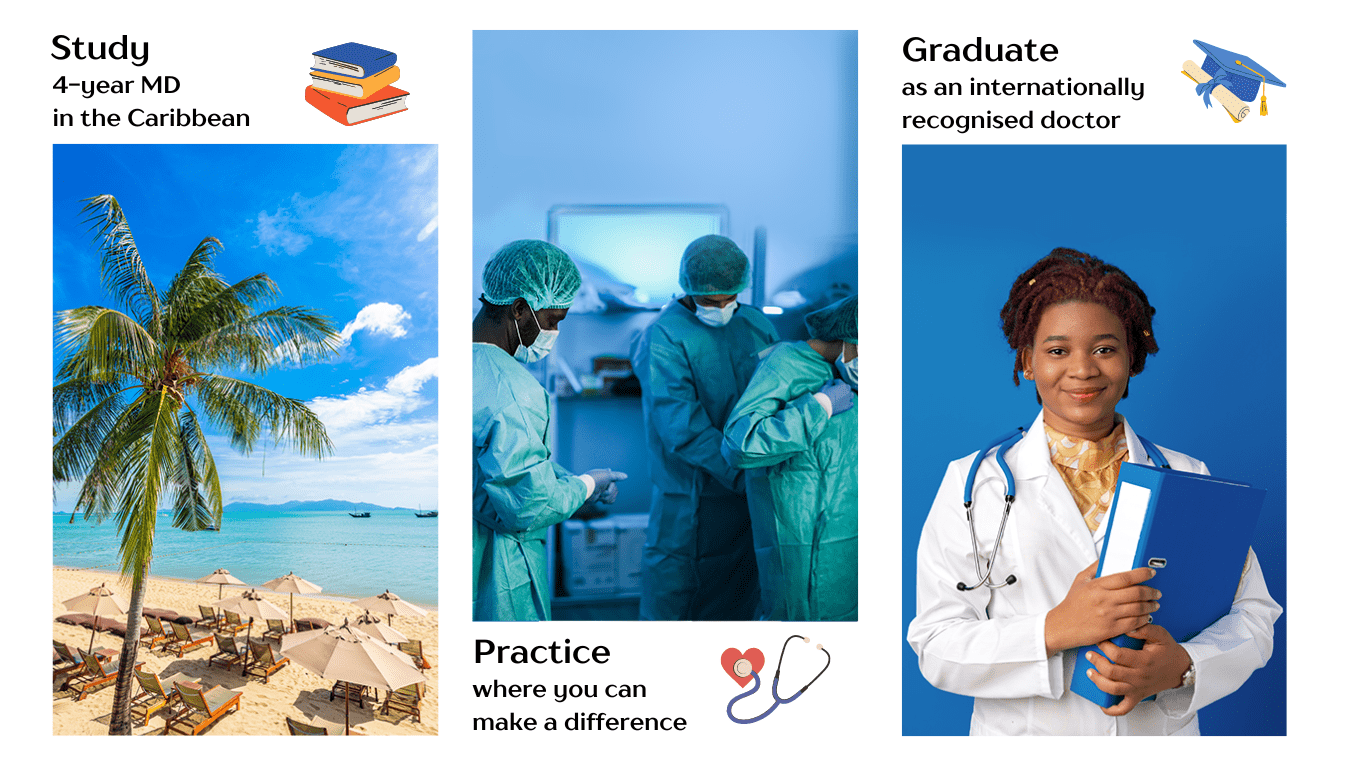Medical Electives in the Caribbean: Your Future in Medicine Under the Palms


Table of Contents
The Caribbean is well-known for its unique island life atmosphere and laid-back culture. However, thanks to the combined effort and significant investments of local governments and international collaborations, the region has also become an increasingly popular destination for graduate-entry Medicine courses and medical electives.
In this blog, we will tell you about all the advantages and subtle nuances of medical electives in the Caribbean and how they have become a viable option for any aspiring healthcare professional.
Let’s get straight into it.
Why Choose the Caribbean for Medical Electives?
Medical electives in the Caribbean are not just about enhancing clinical skills and theoretical knowledge; they are about broadening perspectives and gaining invaluable experience. Students get to engage with varied healthcare systems that differ significantly from those in the West and get a taste of global health challenges.
The exposure to a wide range of patient cases, tropical diseases and challenging healthcare environments in the Caribbean is invaluable for a successful and diversified career in medicine. Dealing with these circumstances will not only develop adaptability in students but also innovation and cultural awareness in the next generation of medical professionals.
Here are just some of the benefits you can get from studying Medicine in the Caribbean:
- High-quality education: The reputable Caribbean medical schools boast accreditation from both their local governments and international bodies, ensuring that the education and training offered are on par with global standards. The best medical schools in the region are often compared and likened to the standards of the medical universities in the United States.
- Diverse clinical exposure: The Caribbean's unique health landscape presents medical conditions that are uncommon or unseen in other parts of the world. This provides students with a rare opportunity to learn about the diversity of tropical diseases and healthcare practices in a variety of clinical settings.
- Global networking opportunities: Students and teaching experts from all over the world come to the Caribbean for their medical studies and professional practices. This creates a strong and rich network of global contacts and opportunities for international collaborations in the future.
- Research opportunities: Many universities in the Caribbean have dedicated research centres, which offer students the chance to personally and directly contribute to groundbreaking medical studies, all while gaining valuable research experience.


Types of Medical Electives Available in the Caribbean
The available medical electives in the Caribbean are similar to those you would expect to find in any comprehensive medical education programme. However, there are some interesting and unique region-specific additions which attract students from all around the world.
When studying medicine in the Caribbean, students have access to the following types of electives:
Primary care and community health
These electives focus on primary healthcare in community settings. Students get to work in clinics and health centres that deal with a wide range of common health issues. This establishes and reinforces the understanding of the basics of community healthcare.


Hospital-based specialities
For those interested in more specialised areas, hospital-based electives provide experience in departments like surgery, paediatrics, obstetrics, gynaecology, and internal medicine. These electives offer a closer look at the functioning of hospital systems in the Caribbean.


Research Electives
Students with an interest in medical research can engage in electives focused on various research projects. These can range from clinical trials to public health research, offering insights into the research methodologies and healthcare challenges specific to the region.


Tropical medicine
Unique to the Caribbean region, these electives provide hands-on experience with tropical diseases that are rare in other parts of the world. It's an opportunity to learn about the diagnosis, treatment, and prevention of these uncommon diseases.


Public health and epidemiology
Given the diverse health challenges in the Caribbean, electives in public health and epidemiology are crucial. They offer experience and insight into the strategies and policies implemented to tackle health issues at a population-wide level.


Emergency medicine and critical care
These electives provide experience in fast-paced environments where quick decision-making and hands-on skills are essential. They're ideal for students interested in emergency medicine, critical care, and trauma.


However, the availability of each elective in the Caribbean depends entirely on the curriculum of the university you will be attending.
If you would like to get a custom-tailored university recommendation for your interests and ambitions, Medlink Students are widely recognised as the best in guiding future healthcare professionals to their dream destinations.
With over a decade of experience, we’ve guided 50,000+ students on their path to medical education. We’ve got the expertise necessary to help you choose the perfect medical school where you can accomplish the goals you’ve set for yourself. The best part is that you can sign up for a completely free and quick consultation, where we can help you kickstart your career:
Check your email to Book a FREE call
with an expert advisor
Look at your promotions/spam folders, just in case.
What to Expect from The Educational Experience in Caribbean Medical Electives
The Caribbean's approach to medical education, particularly during electives, is distinguished by a rigorous academic curriculum and extensive practical training. This combination ensures that students are not only theoretically well-prepared but also capable of applying their knowledge in real-world scenarios.
Caribbean medical electives typically follow a curriculum that aligns with international standards, akin to those in the US. This ensures that students from all over the world find the courses relevant and comprehensive.
This is further enhanced by the emphasis on practical, hands-on experience. Students are often placed in clinical settings from the start of their electives, which allows them to interact with patients and healthcare professionals from early on in their careers. This exposure is vital in developing clinical and interpersonal skills, as well as the ability to make informed, empathetic decisions.
On top of that, the diverse healthcare environment in the Caribbean prepares students to be adaptable and resourceful. You will be able to learn to work in a variety of settings - from well-equipped hospitals to resource-limited clinics, which is an invaluable skill in today’s globalised world.
Another thing you can look forward to while studying in the Caribbean is learning to navigate and respect different cultural traditions and attitudes towards health and medicine. This aspect of the curriculum is crucial in shaping globally competent and culturally sensitive healthcare professionals who can succeed anywhere in the world.
By combining all of these essential skills, it is safe to say that the medical electives in the Caribbean offer an educational experience that is both challenging and rewarding. This experience demonstrates a student's initiative, adaptability, and willingness to step out of their comfort zone.
Graduates with international elective experience, especially from a region as diverse as the Caribbean, often achieve greater success in their careers and are highly sought after by employers.
An excellent example of a top-tier medical school in the Caribbean is the University of Health Sciences School of Medicine in Antigua & Barbuda. Here, you will benefit from all of the advantages that come with high-quality medical education while also having a rich choice for electives and speciality courses.
Conclusion
Students who choose the Caribbean for their medical electives not only gain advanced medical knowledge and practical skills but also develop a global perspective and cultural awareness that are indispensable in today’s healthcare landscape. These experiences nurture adaptable, empathetic, and well-rounded professionals who are ready to face the diverse challenges of the medical field.
Oh, and we can’t forget to mention that you can gain all of these skills and knowledge while living in one of the nicest places on the earth - the tropical paradise of the Caribbean. We are confident that no matter how many hardships you go through during your medical electives, you will be able to wash it all away in the blissful atmosphere under the palm trees.
Frequently Asked Questions about Medical Electives in the Caribbean
What are the eligibility requirements for medical electives in the Caribbean?
Typically, students should be enrolled in a recognised medical school and have completed specific prerequisites. However, requirements can vary by university, so it's best to check with the specific school or by inquiring with Medlink Students.
How long do medical electives in the Caribbean last?
Electives can range from a few weeks to several months. The duration might depend on the student's academic requirements and the elective programme selected.
Are Caribbean medical electives recognised internationally?
Many Caribbean medical schools are accredited, and their elective programmes are recognised globally. However, students should verify the accreditation status and recognition of the programme in their home country.
Can I choose the speciality for my elective?
Yes, students usually have the flexibility to choose from a range of specialities depending on their interests and career goals.
What language skills are required for Caribbean medical electives?
English is commonly spoken in many Caribbean countries, especially in academic and medical settings. However, knowledge of local languages can be beneficial, particularly for patient interactions.
How much does it cost to do a medical elective in the Caribbean?
Costs vary depending on the location, duration, and type of elective. Students should consider tuition, accommodation, living expenses, and travel costs in their budgeting. Medlink Students provides free consultations to help you choose your perfect destination.
What kind of visa do I need for a medical elective in the Caribbean?
Visa requirements vary by country and duration of stay. It's essential to consult the embassy or consulate of the destination country for specific visa information. We can help you with submitting the proper documents and securing your visa.
Can I get academic credit for my elective?
Many medical schools in the Caribbean offer academic credit for approved electives. However, students should always confirm this with their university and the elective programme before enrolling.
Leave a Reply

About Medlink Students
Leading international recruitment company for medical students in Europe. British Council Certified Agents. 10+ years of experience and more than 10,000 students advised.








